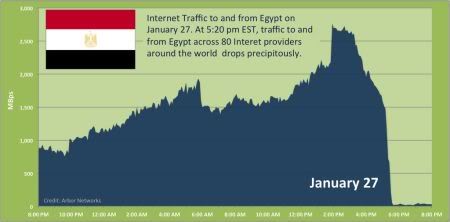Pulling the plug on the internet in Egypt - what our handlers would like to be able to do in the U.S. [UPDATE]
here's an arresting visual...

make no mistake... what happened early this morning in egypt is precisely what our super-rich elites and their bought and paid-for puppets in government would like to be able to do to us if, at some point, Things Get Out Of Hand...
About a half-hour past midnight Friday morning in Egypt, the Internet went dead.
Almost simultaneously, the handful of companies that pipe the Internet into and out of Egypt went dark as protesters were gearing up for a fresh round of demonstrations calling for the end of President Hosni Mubarak's nearly 30-year rule, experts said.
Egypt has apparently done what many technologists thought was unthinkable for any country with a major Internet economy: It unplugged itself entirely from the Internet to try and silence dissent.
Experts say it's unlikely that what's happened in Egypt could happen in the United States because the U.S. has numerous Internet providers and ways of connecting to the Internet. Coordinating a simultaneous shutdown would be a massive undertaking.
"It can't happen here," said Jim Cowie, the chief technology officer and a co-founder of Renesys, a network security firm in Manchester, N.H., that studies Internet disruptions. "How many people would you have to call to shut down the U.S. Internet? Hundreds, thousands maybe? We have enough Internet here that we can have our own Internet. If you cut it off, that leads to a philosophical question: Who got cut off from the Internet, us or the rest of the world?"
In fact, there are few countries anywhere with all their central Internet connections in one place or so few places that they can be severed at the same time. But the idea of a single "kill switch" to turn the Internet on and off has seduced some American lawmakers, who have pushed for the power to shutter the Internet in a national emergency.
The Internet blackout in Egypt shows that a country with strong control over its Internet providers apparently can force all of them to pull their plugs at once, something that Cowie called "almost entirely unprecedented in Internet history."
[...]
In 2009, Iran disrupted Internet service to try to curb protests over disputed elections. And two years before that, Burma's Internet was crippled when military leaders apparently took the drastic step of physically disconnecting primary communications links in major cities, a tactic that was foiled by activists armed with cell phones and satellite links.
Computer experts say what sets Egypt's action apart is that the entire country was disconnected in an apparently coordinated effort, and that all manner of devices are affected, from mobile phones to laptops. It seems, though, that satellite phones would not be affected.
here's what's proposed for the u.s., sans any option for judicial review...
four days ago via cnet...
Internet 'kill switch' bill will return
A controversial bill handing President Obama power over privately owned computer systems during a "national cyberemergency," and prohibiting any review by the court system, will return this year.Internet companies should not be alarmed by the legislation, first introduced last summer by Sens. Joseph Lieberman (I-Conn.) and Susan Collins (R-Maine), a Senate aide said last week. Lieberman, an independent who caucuses with Democrats, is chairman of the Senate Homeland Security and Governmental Affairs Committee.
"We're not trying to mandate any requirements for the entire Internet, the entire Internet backbone," said Brandon Milhorn, Republican staff director and counsel for the committee.
Instead, Milhorn said at a conference in Washington, D.C., the point of the proposal is to assert governmental control only over those "crucial components that form our nation's critical infrastructure."
what is happening in egypt should be a wake-up call for the rest of the world...
meanwhile, after the fall of the government in tunisia, the escalation in egypt and now in yemen, and there are even tremors being felt in jordan, one of the most stable of the regional states...
Thousands of protesters on Thursday took to the streets of Yemen, one of the Middle East’s most impoverished countries, and secular and Islamist Egyptian opposition leaders vowed to join large protests expected Friday as calls for change rang across the Arab world.
The Yemeni protests were another moment of tumult in a region whose aging order of American-backed governments appears to be staggering. In a span of just weeks, Tunisia’s government has fallen, Egypt’s appears shaken and countries like Jordan and Yemen are bracing against demands of movements with divergent goals but similar means.
i am definitely feeling tectonic plates shifting...
Labels: Barack Obama, egypt, internet, internet "kill" switch, Jordan, judicial review, Middle East, protestors, Tunisia, Yemen
Submit To PropellerTweet














